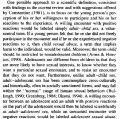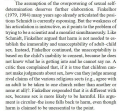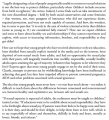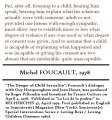Debate Guide: Problems with the Age of Consent
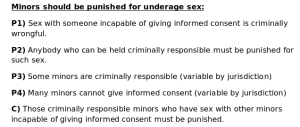
Here, you will find a list of basic philosophical and practical problems with the Age of Consent laws.*
1. Arbitrary:
- In the absence of 'Romeo and Juliet' laws, the age of consent is an 'all or nothing' absolutist law, regarding whether a crime has been committed. Although courts do take into account the nature of a relationship in sentencing, there is always the possibility of two partners either side of the statutory age falling foul of the law. The law is quite unlike most others concerning the ethics of personal conduct in that it draws a line in the sand, and does not lend itself well to learning from the qualities of a relationship, i.e. lived experience.
- See also - Debate Guide: Legal pragmatism.
2. Varies too much across cultures to be taken seriously:
- A quick look through an ages of consent list reveals that even the US states are far from agreed upon what is appropriate. The AoC varies so widely across the world (11 - 21, until recently as low as 7), that some of the harm said to befall minors in Child Sexual Abuse is supposedly occurring free from legal repercussions. Has there been any research done into psychological repercussions in these countries? If not, why? Compare teenage pregnancy rates from the Netherlands (when the AoC was set at 12) to other countries at the same time.
3. It is frequently ignored by far too many young people to make sense maintaining:
- Like prohibited psychoactive drugs, the Age of Consent is a boundary to be broken between young people. National AoCs, appear to have little correlation with the average ages of first penetrative sex around the world. Compare the Durex Survey figures[1] for the latter age with the age of consent list, and you will find that if anything, the countries at the extreme ends of the age of first sex scale have AoCs which reflect their society's acceptance of young sex. The pattern is varied, though. Refer to Spain at 17.5 (AoC was 13 at the time) and Italy at 18.1 (AoC 14) and compare to the USA at 16.9, where the AoC is often 18. Many people have non penetrative experiences at much younger ages than the "virginity" loss ages (and the ages of consent). With ages of puberty still falling and ages of consent rising, the "frustration zone" increases in size, increasing the chances of irresponsible sex among the young.
4. Does not achieve it's objectives, because it drives youth into the hands of criminals and abusers and does not prevent rape:
- Since physical abuse can be a punishable crime regardless of the age of consent, all the absence of such a law can do is give participants a choice in deciding what equals abuse in the context of their relationship. Harmful abuse (physical coercion and illegitimately obtained consent) continues in countries with a high AoC is, and remains against the law in countries with a low age.
- A more liberal, less stigmatizing and punitive legal system would mean that less of these relationships would be hidden, making abuse more conspicuous and easier to speak out about. There would be less of an incentive for blackmail, intimidation and physical mistreatment, if legitimate minor-adult relations were legal. Society as a whole needs to become more aware of what constitutes abuse (i.e. coercion / harm, on the complaint of a victim or observer), and what constitutes a healthy relationship. Finally, minors would be permitted relations with more responsible and law-abiding adults, who by default will not seek such relationships under prohibition.
Excerpt gallery
Various theoretical objections to the broader concept of informed consent as applied to sex.
-
Bruce Rind on CSA concept (in)validity
-
Rind on lack of predictive validity for informed consent/CSA concept invalidity
-
Rind - CSA concept invalidity continued
-
David Finkelhor (Abuse Guru) and his failed moral circular argument
-
Robert Ehman on the failed circular "consent" argument
-
Robert Ehman on the real reasons for consent vs no consent binarism
-
Terry Leahy: Absence of an ethical argument against age-gap sex
-
Paul Okami on Power Imbalance argument (from Peer Commentaries on Green (2002) and Schmidt (2002))
-
Review of Sandfort and consent
-
Scott De Orio on Queer Identities that don't fit the model of consent
-
Liz Highleyman's review of Judith Levine's Harmful to Minors
-
Liz Highleyman's review of Judith Levine's Harmful to Minors: Consent dogma
-
Foucault, 1978
*Please note, that in our ethos, we have a policy of supporting an elective consenting age as low as 12.


